Scratch Ori Striker Original Design / Scratch Built
Scratch - Ori Striker {Scratch}
Contributed by Drake "Doc" Damerau
| Manufacturer: | Scratch |

Brief:
The Ori Striker is a scratchbuilt rocket resembling a space fighter. She goes
up on a 24mm engine and comes down on a 24" parachute. The finished weight
is 4.9oz.
Construction:
The parts list:
- Midwest balsa 3/32" x 4" x 36" (Which is plenty left over in case of a screw up)
- BT-5 -- two 5 1/8" nacelle tubes and one 2" spacer tool
- BT-80 Duct tube - 2.6"
- 2 main tubes consisting of 18" BT-55 with a coupler
- MMT rings
- 24mm MMT tube
- nose cone
- launch lugs
- Chore Boy (baffle)
- shock cord
- 24" parachute
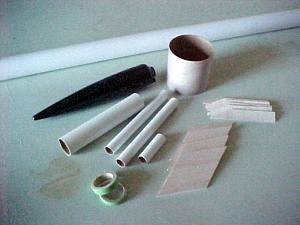
Cut and mark all
the tubes
Cut the 2.6" duct tube from a BT-80. You'll need to draw six lines on the
end of one of the BT-55 body tubes and 6 "tick marks" on the ends of
the BT-80 duct tube. To do this, I use VCP. With VCP, make two fin wrappers,
both having 6 fins. Make one for the BT and one for the duct.
Cut two nacelle tubes 5 1/8" long and one 2" piece from the BT-5. The 2" piece will be used as a spacer when assembling the wings. Use VCP to make a fin alignment wrapper for the nacelle. Set it to make a two finned rocket. This will draw lines 180 degrees apart.
Position the small fin position wrapper at one end of the main BT and mark the lines. Use a door jamb to extend the lines. Draw one of the lines halfway up the tube for a launch lug. Use the big wrap for the duct tube and mark the end of the tube where the lines would go. These points or "tick marks" will help you align the fins later.
Seal the ends of all tubes with CA and sand the rough edges.
From the EMRR Tip Library:
Glue Use CA around the inside of the body tube for reinforcement. Put CA around an inch inside. Sanding will be required to be able to fit the nose cone on. Make sure to wear gloves when using CA.
Glue the duct fins to the body
Glue all 6 fins onto the main BT. Use the marks on the duct tube to help you
align the fins properly. Use CA to tack them in place and to align them. Follow
up with wood glue. Apply fillets and sand now. You may want to seal or prime
the fins now because this wont be possible once the BT-80 duct tube is in
place.
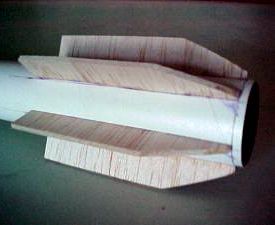
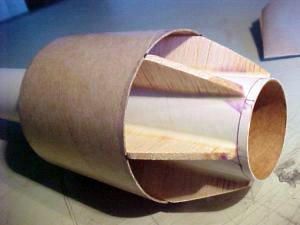
Build the wings
Cut four main fins as shown using the fin guide. Make sure the grain is going
the proper direction.[Click here
to download the fin template.]
From the EMRR Tip Library:
Fins Make sure when cutting out fins from balsa sheets that the leading edge goes parallel (with) the grain of the balsa, failure to do this leads to weak fins, which will break easily.
Bevel the leading and trailing fin edges of all four fins.
Measure 2.5" on the nacelles. This leaves the tube 1/8" longer for the aft end of the wings.
Using the "spacer tool", glue the fins to the nacelles as shown. Do NOT glue the spacer tool in place! Tack them in place with CA. Once dry, follow up with wood glue. You can apply fillets now or wait until the rocket is completely assembled.
Glue the wings to the duct
Slightly bevel the side that touches the big tube for more contact. Do this by
wrapping a piece of sand paper around the duct tube and sanding the wings
against it. Glue the fins/nacelle assembly to the duct tube. To
From the EMRR Tip Library:
If you have a rocket kit that isn't TTW, and you just hate sanding tubes and stuff, get a sharp X-acto knife, and using a door frame, draw a pencil line all the way through the length of the tube where the fins will be. Then put your fin on (without glue) where it is supposed to be, take a pencil, draw out the thickness of the fins on the top. Then use door knob draw 2 straight parallel lines so it would look like a slot. It's like making slot, only this time you lightly cut along the lines (the thickness of the fin) only cutting the first layer off. Then peel off that first layer. Then glue as usual. This should allow the glue to soak in a lot. - T.F.
Assemble a 24mm motor mount with 1/8" of the tube protruding beyond the centering ring. I chose to make it friction fit so I could use any length motor I want. Glue it onto the aft of the rocket.
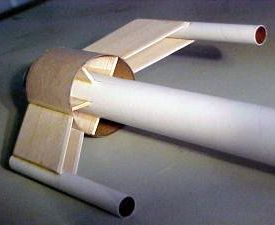
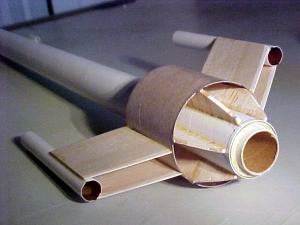
Recovery equipment
I used some Chore Boy scouring pad material for an ejection baffle. This adds
weight and is only an option. Using Chore Boy pads allow you to never need
ejection wadding. I you decide to use it, push it all the way down to the motor
mount area with a dowel. I used a 48" length of 1/4" shock cord glued
in using the age-old Estes method. I chose to use a 24" Estes parachute to
finish off the recovery system.
Finishing:
I painted the entire rocket yellow. Once the paint is dry, mask off the areas
seen and paint with satin black. The ends of the nacelles and the motor area
are painted with Testor's neon orange. The decals I used are a selection from
Sirius Rocketry decal sheet #D-0005 and some stickers from the Estes Outlander.
I built the Outlander and used a Sirius Rocketry "Mars Lander 2"
decal sheet. (See
here
for details.)
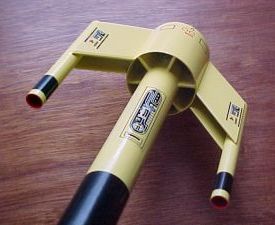
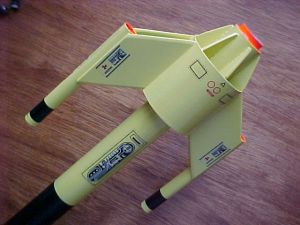
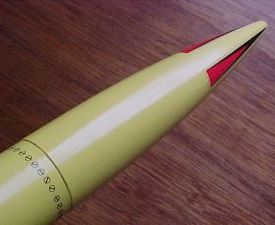
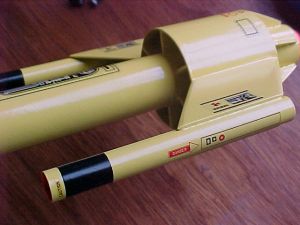
Flight:
The first flight was on a C6-3 using an adaptor. Surprisingly, it flew well on
such a small motor but the ejection was a bit late. The second flight was on a
C11-3. This time the delay was right there. The third and final flight of the
day was on a D12-5. The delay was a bit early, but the flight was sweet.
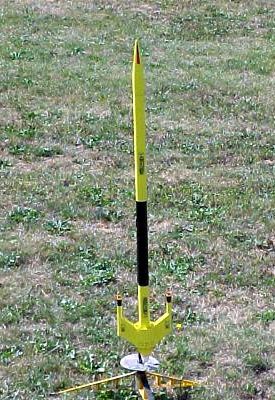
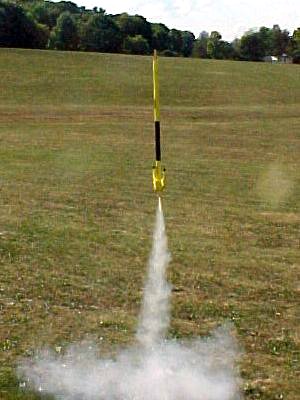
 |
 |